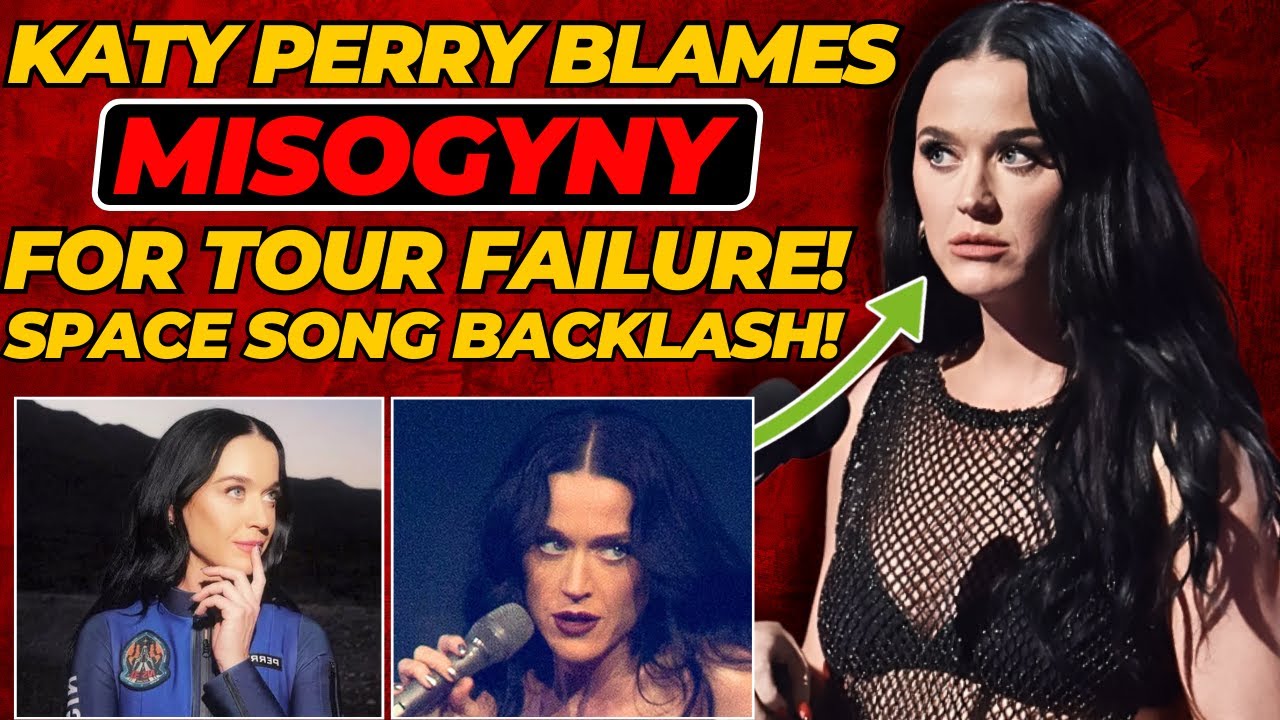Katy Perry’s Spaceflight Comments: A Controversy That Keeps Growing
Katy Perry, once the reigning queen of bubblegum pop with hits like Firework and Roar, has found herself at the center of a public relations storm in 2025. Her 11-minute suborbital spaceflight aboard Blue Origin’s New Shepard rocket on April 14, 2025, was intended to be a triumphant moment, showcasing an all-female crew and promoting women in aeronautics. Instead, it sparked widespread criticism, with fans, celebrities, and even fast-food chains slamming the trip as tone-deaf amid global economic struggles. Perry’s subsequent comments—ranging from emotional reflections on feeling “connected to the divine feminine” to describing herself as a “human piñata” battered by online critics—have only poured fuel on the fire. This article explores why Perry’s spaceflight and her remarks have spiraled into a full-blown controversy, how they’ve impacted her public image, and what this means for her career amid an already turbulent year.

The Spaceflight: A Bold Move with Poor Timing
On April 14, 2025, Perry joined an all-female crew—journalist Lauren Sánchez, TV host Gayle King, film producer Kerianne Flynn, former NASA rocket scientist Aisha Bowe, and activist Amanda Nguyen—for Blue Origin’s NS-31 mission. The 10-minute, 21-second flight took them 66.5 miles above Earth, offering a brief taste of weightlessness and a view of the planet’s curvature. Marketed as a historic milestone—the first all-female spaceflight crew since Valentina Tereshkova’s solo mission in 1963—the trip aimed to inspire future generations, particularly women, to pursue careers in STEM and space exploration. Perry, holding a daisy in honor of her daughter Daisy, tearfully described the experience as “life-changing,” emphasizing its collective energy and the need to protect Earth.
However, the mission’s timing and execution drew immediate backlash. With the United States grappling with economic uncertainty—described by some as “on the brink of recession”—and global challenges like rising living costs, many saw the flight as an extravagant stunt for the ultra-wealthy. Social media platforms, particularly X, erupted with criticism, with users calling it a “totally tone-deaf moment” for “rich people playing in space while the world is falling apart for the rest of us.” The high-profile nature of the crew, especially Perry’s involvement, amplified the scrutiny. While Bowe and Nguyen, respected figures in science and advocacy, were relatively overlooked, Perry’s celebrity status made her the lightning rod for public ire. Posts on X mocked her for singing What a Wonderful World in zero gravity and questioned the mission’s purpose, with one user quipping, “Why didn’t she stay in space?”
The backlash wasn’t limited to fans. Celebrities like Olivia Munn, Amy Schumer, and Emily Ratajkowski publicly criticized the flight, with Lily Allen initially calling it “out of touch” on her Miss Me? podcast, though she later apologized for singling out Perry. Even Wendy’s joined the fray, posting a sarcastic remark on X about sending Perry back to space. The criticism centered on the perception that the flight, costing an estimated $200,000–$250,000 per seat, was less about scientific advancement and more about publicity for Blue Origin and its high-profile passengers. British astronaut Tim Peake, who spent six months on the International Space Station, noted that the mission’s PR was “not handled very well,” further highlighting its missteps.
Perry’s Comments: From Inspiration to Defensiveness
Perry’s attempts to address the controversy have only deepened the divide. Immediately after the flight, she spoke passionately about its symbolic importance, stating it was about “making space for future women and taking up space and belonging.” She connected the experience to her personal growth, saying it made her feel “super connected to the strong divine feminine” and that she found “love for herself” during the journey. While these remarks were intended to inspire, many found them disconnected from the public’s concerns. Posts on X labeled them “cringe,” with one prominent user sarcastically suggesting her microphone be taken away.
As the backlash intensified, Perry shifted to a more defensive tone. On April 29, 2025, she responded to a fan-made billboard promoting her Lifetimes tour with a lengthy Instagram comment, writing, “When the ‘online’ world tries to make me a human piñata, I take it with grace and send them love, cause I know so many people are hurting in so many ways and the internet is very much so a dumping ground for unhinged and unhealed.” She acknowledged feeling “battered and bruised” but insisted she remained “heart open and honest” thanks to her fans’ support. While some fans praised her resilience, others saw the comment as dismissive, accusing her of playing the victim rather than addressing the valid critiques about privilege and timing.
Perry’s refusal to apologize or directly engage with the criticism has been a focal point of the controversy. In a social media comment on April 30, she expressed gratitude for her fans but maintained that the negativity stemmed from “unhinged” critics, a stance that alienated those who felt her actions warranted accountability. Her remarks about the flight’s empowering message, while well-intentioned, were perceived as out of touch by a public struggling with real-world issues. The contrast between her emotional, almost spiritual framing of the experience and the public’s economic frustrations created a narrative of a celebrity detached from reality.
A Career Already on Shaky Ground
The spaceflight controversy comes at a precarious time for Perry. Her seventh album, 143, released in 2024, received harsh reviews for its simplistic lyrics and controversial collaboration with producer Dr. Luke, who faced past allegations of sexual abuse. The lead single, Woman’s World, was criticized for its heavy-handed feminist themes, and the album failed to match the commercial success of her earlier work like Teenage Dream. Her Lifetimes tour, launched on April 23, 2025, in Mexico City, has also faced challenges, with reports of underwhelming ticket sales and a voice issue Perry attributed to a flu-cold. Additionally, her Las Vegas residency, PLAY, which ran from 2021 to 2023, reportedly lost money for Resorts World, with sources claiming she was paid $750,000–$900,000 per show but underperformed financially.
These setbacks have fueled a perception that Perry’s star power is waning. The spaceflight, initially seen as a chance to shift the narrative and generate buzz for her tour, instead exacerbated her career woes. The public’s frustration with her space comments is not just about the flight itself but also a culmination of disappointment with her recent artistic choices and perceived insensitivity. Social media has amplified this sentiment, with toxic comments targeting not only Perry but also her four-year-old daughter, Daisy, highlighting the darker side of online criticism. Perry’s acknowledgment of feeling like a “human piñata” reflects the intensity of the backlash, but her focus on personal pain over public accountability has done little to quell the storm.
Why the Controversy Persists
Several factors explain why Perry’s spaceflight comments have spiraled out of control. First, the mission’s framing as a feminist milestone clashed with its execution as a high-cost publicity event. While the inclusion of figures like Bowe and Nguyen lent credibility, Perry’s prominence in promotional materials—floating with a butterfly featuring her tour tracklist—made it feel more like a celebrity stunt than a scientific endeavor. This disconnect fueled accusations of exploiting a serious cause for personal gain.
Second, Perry’s responses have failed to bridge the gap between her intentions and public perception. Her initial comments about the “divine feminine” and collective energy were too abstract for a public seeking grounded accountability. Her later defensiveness, while humanizing her emotional toll, came across as tone-deaf to those who felt the flight itself was the issue, not the criticism. The lack of a clear apology or acknowledgment of the economic context has kept the controversy alive, with X users continuing to mock her “piñata” metaphor and question her self-awareness.
Finally, the broader social media landscape has intensified the backlash. The internet’s “frenzied” nature, as noted by fan community leader Simon Diego, has turned valid critiques into personal attacks, with some comments crossing into cruelty. This toxic cycle—where Perry’s missteps are met with disproportionate vitriol—has made it harder for her to regain public favor. Even supportive fans, like those behind the Katy Perry Brasil billboard, have called out media outlets for misrepresenting her comments, accusing them of “clickbait” headlines that exaggerate the controversy.
Implications for Perry and the Industry
The fallout from Perry’s spaceflight comments underscores the challenges celebrities face in navigating a polarized online world. For Perry, the controversy has deepened her career crisis, raising questions about her ability to reclaim her pop culture dominance. Her Lifetimes tour, already struggling with mixed reviews, now faces the added burden of a tarnished public image. While her loyal fanbase remains a lifeline, winning back a broader audience will require strategic moves—perhaps a more relatable public persona or music that reconnects with her roots.
For the entertainment industry, Perry’s saga highlights the risks of high-profile PR stunts in an era of economic sensitivity. Blue Origin’s mission, while a technical success, misjudged the public mood, and Perry’s role as its most visible face amplified the backlash. Future celebrity-driven spaceflights will need better PR strategies to avoid similar pitfalls, emphasizing substance over spectacle. The controversy also reflects broader tensions in pop culture, where stars are held to increasingly high standards of social awareness, and missteps are magnified by social media’s unforgiving lens.
Conclusion: A Star Grounded by Controversy
Katy Perry’s spaceflight was meant to be a soaring moment of empowerment and inspiration. Instead, her comments—first lofty, then defensive—have turned it into a cautionary tale of misaligned intentions and poor timing. The backlash, while harsh, stems from a public frustrated by perceived privilege in a time of struggle. Perry’s description of herself as a “human piñata” captures the intensity of the criticism, but her failure to fully address the root causes has kept the controversy alive. As she navigates her Lifetimes tour and a challenging career phase, Perry’s next steps will determine whether she can rise above the storm or remain grounded by its weight. For now, her cosmic misstep remains a lightning rod for debate, reminding us of the fine line between stardom and scrutiny.





